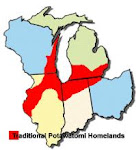The Indian Health Services (IHS) is operated under the Department of Health and Human Services. It is responsible for providing health care for American Indians and Alaska Natives. 55% of all Native Americans rely on IHS in 49 hospitals and 600 facilities.
Native Americans are 600% more likely to get tuberculosis and 189% more likely to get diabetes. 12% lack a proper water supply. Which usually leads to the question, "Why should American Indians get health care?" The Supreme Court has heard many cases involving this issue. The primary reason for IHS is the Snyder Act of 1921. It authorized funds "for the relief of distress and conservation of health, for the employment of the American Indian and many other items." These Acts came partially about because of forced removal of the American Indian onto reservations and a lack of medical care and educational opportunities on these sovereign lands.
Congress then passed the Indian-Self-Determination and Education Assistance Act that provided the IHS and education grants to allow the American Indian with similar benefits of other poor and needy United States Citizens.
Then Congress passed the Indian Health Care Improvement Act, which was suppose to provide quality and quantity of health services to the American Indian. Today the IHS is funded by only half the money that necessary to provide adequate care to full fill these laws and promises. Back in the day laws and promises were called treaty's, they are and were agreements made during some of Americas darkest times for the American Indian.
The honoring of these agreements to the American Indian is what makes America, America. And the American Indian is one of the first thing's other countries thinks about when they hear the word America, if I asked you to describe what is America in five descriptions, chances are American Indians would be one of the five descriptions.
Link to locations: Map to locations link
Pokagon Times
MISSION
News source for
the Potawatomi
All are welcome
Site started for
cultural awarness
the Potawatomi
All are welcome
Site started for
cultural awarness
Coming Soon
Pokagon Radio
News
Events
Music
News
Events
Music
Nchiwenenmo
Comments?
Tweetybird@
hushmail.com
Tweetybird@
hushmail.com
Introduction
9 Potawatomi Tribes
Searching For Potawatomi
Topics
- A Introduction (1)
- Blue Chip (6)
- Boarding School (4)
- Citizen (12)
- Citizen II (2)
- Culture (9)
- Entertainment (27)
- FireKeepers (14)
- FireKeepers II (8)
- Forest County (15)
- Four Winds (2)
- Gambling News (13)
- Grant link (2)
- Gun Lake (4)
- Hannahville (5)
- Hate mail (1)
- Health (1)
- History (2)
- Indian Health (2)
- Lakes (4)
- Language (4)
- Law (10)
- Matthew Wesaw (2)
- Mother Earth (1)
- Native News (16)
- Native News II (2)
- Nottawaseppi (17)
- Obittuary (4)
- Pokagon Artist (6)
- Pokagon Member (4)
- Pokagon News (21)
- Pokagon News II (4)
- Pokagon Obituary (4)
- Pokagon Teacher (8)
- Potawatomi (13)
- Potawatomi Bingo (3)
- Potawatomi II (5)
- Pow Wow (3)
- Prairie (16)
- Saginaw Chippewa (8)
- Sale Items (3)
- Souix (5)
- Story Telling (1)
- Walpole Island (5)
- Wasauksing (7)
Events
Searching For Pokagons
Boarding School
Jana sings
Learning Series
No Politics!
Culture
Language
The Arts
The News
Culture
Language
The Arts
The News
Midnight Express
Potawatomi Artists
Ribbon Town
Museums
IHS Help
Learn Potawatomi
by Donald Perrot
Donald Perrot
Potawatomi Language
About Potawatomi
Potawatomi Artifacts
Potawatomi Food
Pokagon Culture
Pokagon Pow Wow
Sacred Places
Pokagon
Pokagon Contracts
Some Pokagon's
Click on to meet.
Podcasts
Reviews
Trail of Death
Photograph's
Native Stores
Potawatomi Bloggers
Veterans
My Daily Read
Places I relax
Got a story? email
email me, that is
how many stories
originate.
Tweetybird@
hushmail.com
email me, that is
how many stories
originate.
Tweetybird@
hushmail.com
,+Karen+Bush+Gibson,+Ex-+-+eBay+(item+360233250981+end+time+Mar-09-10+19-22-27+PST)_1265816805474.jpeg)






























